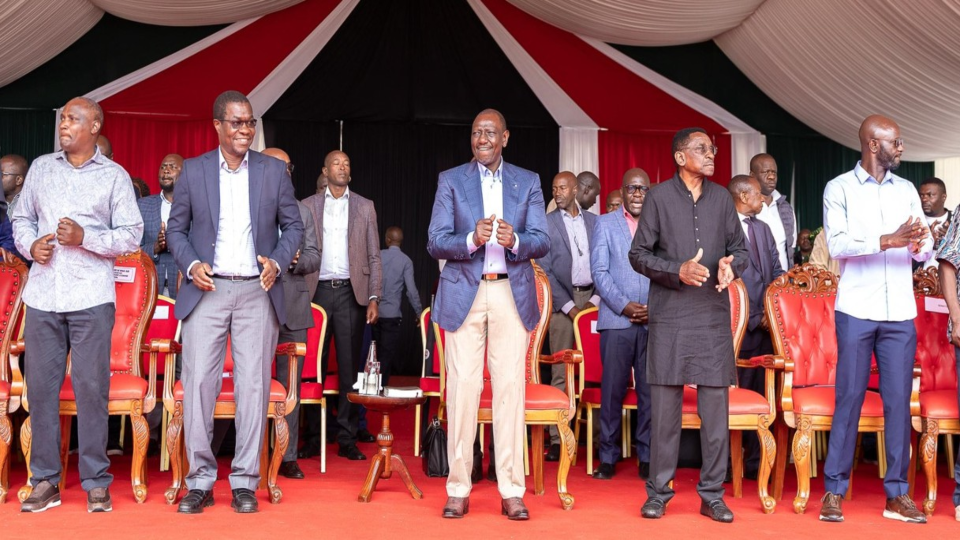President Ruto Commits to Full e-Procurement System Rollout Amid Opposition
During a church service at St Peter’s ACK Cathedral in Siaya County, President William Ruto reaffirmed his administration’s unwavering commitment to implementing a fully digital e-procurement system across all government operations, despite facing significant resistance. Speaking passionately to the congregation, Ruto emphasized that the initiative is a cornerstone of his government’s strategy to combat corruption and enhance transparency in the procurement of goods and services.
The President accused some government officials of opposing the e-procurement system, alleging that they benefit from the inefficiencies of the current manual processes. He declared that such resistance would not deter his administration’s plans, warning that officials unwilling to adapt to the digital platform should resign. “Procurement and accounting officers do not want this programme because they have been benefiting from the old system,” Ruto stated. “No amount of blackmail or intimidation will force us to go back on electronic procurement. Any government official who is not willing to use it can resign and pursue other interests.”
Ruto highlighted the transformative potential of the e-procurement system, stating that it would allow the public to access detailed information about government purchases, including the cost of items and the identities of suppliers. “We are putting this e-procurement in place so that everybody can know how much an item was bought for and who sold it to the government,” he explained. He further questioned why contracts are often awarded to higher bidders, citing an example where a supplier offering an item for two shillings is overlooked in favor of one charging ten shillings. “That is what we want to do,” he added, underscoring the system’s role in ensuring fairness and accountability.
The push for e-procurement follows Ruto’s directive during his November 2024 State of the Nation Address, where he instructed the National Treasury to complete the rollout by the first quarter of 2025. The system, officially launched by Treasury Cabinet Secretary John Mbadi on April 7, 2025, aims to streamline public procurement processes, increase efficiency, and curb corruption. The National Treasury has reported significant progress, with the system already being piloted in ten state agencies. Starting in July 2025, more government entities are expected to adopt the platform, with only procurements processed through the e-Government Procurement (e-GP) system eligible for approval and payment.
However, the initiative has faced criticism and legal challenges. In April 2025, the National Assembly’s Committee on Delegated Legislation, led by Ainabkoi MP Samuel Chepkonga, annulled a Public Procurement Regulatory Authority circular mandating the use of the e-GP system, citing a lack of legal backing. Minority Leader Junet Mohamed argued that the circular was invalid, stating, “You can’t change the law through a circular. The circular is just a piece of paper.” The committee emphasized that procurement processes must comply with the Constitution and the Public Procurement and Asset Disposal Act, which require fairness, transparency, and competitiveness.
Additionally, Members of Parliament have expressed concerns over the cost of the new system, estimated at Sh3 billion. During a May 2025 session with the National Assembly Finance Committee, MPs questioned the necessity of replacing the existing Integrated Financial Management Information System (IFMIS), which already consumes Sh1.2 billion annually in maintenance. Kesses MP Julius Ruto asked, “Why do we procure a new system when we have spent a lot of money on IFMIS? Isn’t this an expensive venture?” Finance Committee Chair Kuria Kimani echoed these concerns, warning against the risk of investing in another costly project with uncertain outcomes. Only Kitui Central MP David Mboni supported the initiative, calling it long overdue.
Despite the pushback, Treasury Principal Secretary Chris Kiptoo defended the new system, arguing that IFMIS has limited capabilities for e-procurement. “We aim to streamline procurement, having realized it is where we have a problem. The long-term impact outweighs the initial cost,” Kiptoo said. The National Treasury has also encouraged suppliers, contractors, and consultants to self-register on the e-GP portal, with support available at the Treasury Building in Nairobi and Huduma Centres nationwide.
Ruto’s commitment to digitization extends beyond procurement. During his Siaya address, he highlighted the success of the Social Health Authority’s digital systems in identifying fraudsters, contrasting this with the National Hospital Insurance Fund’s KSh30 billion debt due to weak and opaque systems. He also outlined development projects in Siaya County, including a KSh24 billion investment in 8,000 affordable housing units, 18 new markets, and 11,000-bed student hostels for the 2025/2026 financial year. Additionally, Ruto commissioned the KSh1 billion Ugunja-Sega-Ukwala Water Supply and Sanitation Project, which will provide 10 million liters of water daily to 20,000 households, and laid the foundation stone for a KSh70 million modern market in Sidindi, Ugunja Constituency.
The President also announced plans for the Kenya Ports Authority to construct a pier in Usenge, accompanied by a new market, to boost local economic activity. He praised former Prime Minister Raila Odinga for joining his broad-based government, emphasizing the importance of unity in accelerating Kenya’s development. “I stand here in Siaya and say thank you to Raila for agreeing to work with me to accelerate Kenya’s development,” Ruto said, adding that focused and visionary leadership is key to unlocking the country’s potential.
Ruto’s remarks come amid broader concerns about corruption in government tenders, with inflated prices and ghost suppliers draining public resources. The Institute of Economic Affairs has noted that procurement fraud has hindered Kenya’s progress for over a decade, exacerbated by slow automation and non-compliance by procuring entities. The President’s push for e-procurement aligns with his administration’s Digital Superhighway Agenda, which aims to deliver 80% of public services online.
As Kenya moves toward full implementation of the e-procurement system, the debate over its cost, legal foundation, and effectiveness continues. While supporters see it as a vital tool to combat corruption, critics argue that the government must address legal and financial concerns to ensure the system delivers on its promise of transparency and accountability.


